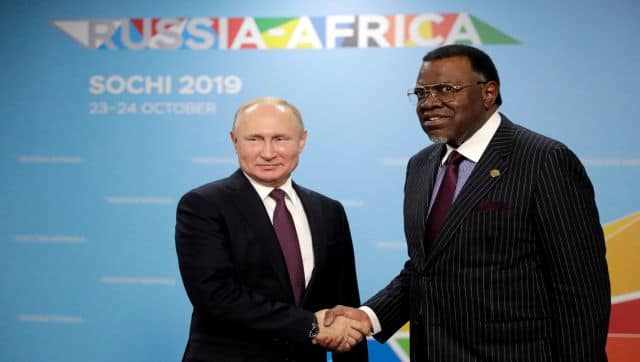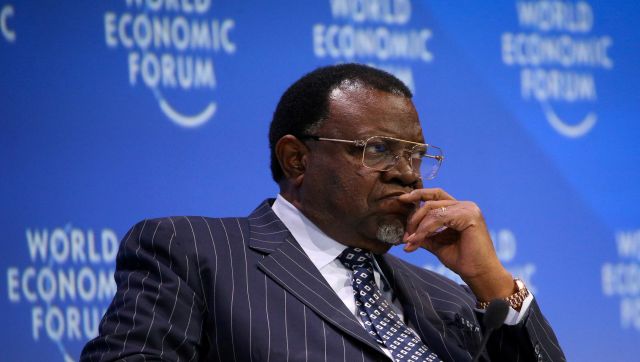Hage Geingob, Namibia’s president and founding prime minister, died early on Sunday in a hospital in the capital, Windhoek, while receiving treatment for cancer. He was 82. Geingob revealed his cancer diagnosis last month. Geingob underwent brain surgery in 2013 and an aortic operation in neighbouring South Africa in 2023. He had been treated at Lady Pohamba Hospital in Windhoek until his death. Hours after his death, Nangolo Mbumba, Namibia’s former vice president, took the oath of office on Sunday, becoming the country’s fourth president after Hage Geingob. The nation had lost a “liberation… icon”, Mbumba said after assuming the office, as reported by BBC. He stated that he has been sworn in as Geingob’s replacement and will hold the position until the elections later this year. But what we know about Namibian president Hage Geingob, who played a modernising role in Africa. Why is his death is such a big loss? The rise and rise of Hage Geingob Hage Geingob played a central role in what has become one of Africa’s most stable democracies after returning from a long exile in Botswana and the United States as an anti-apartheid activist. He was the country’s third president since it gained independence in 1990 following more than a century of German and then apartheid South African rule. Geingob, born in a village in northern Namibia in 1941, was the country’s first president who was not from the Ovambo ethnic group, which accounts for more than half of the population. He began his activism against South Africa’s apartheid regime, which ruled Namibia at the time, when he was in elementary school, before being forced into exile. He spent nearly three decades in Botswana before moving to the United States in 1964. While in the United States, as per a Guardian report, he continued to advocate for Namibia’s independence, representing the local liberation movement, Swapo, which is now the ruling party, at the UN and throughout the Americas. When Swapo won the first elections in 1990, Geingob was appointed prime minister, a position he held for 12 years before resuming in 2012. Geingob was elected president in 2014, after the party easily won another election on the strength of its legacy in the liberation struggle. However, his first term as president was marred by a recession, high unemployment, and corruption charges. [caption id=“attachment_13689392” align=“alignnone” width=“640”] Nangolo Mbumba swears in as president following the death of Hage Geingob, in Windhoek, Namibia. File image/Reuters[/caption] In 2019, Wikileaks documents revealed that government officials accepted bribes from an Icelandic firm in exchange for continued access to Namibia’s fishing grounds, reports The Guardian. The “fish rot” scandal jeopardised Geingob’s chances for a second term, and the president was also chastised for pouring money into an overburdened administration and awarding contracts to foreign companies rather than local ones. His vote share fell significantly in 2019 from 87 per cent in 2014, but he still cruised to victory with 56 per cent of the vote. He had a few health scares in his later years, including brain surgery in 2013 and heart valve surgery in South Africa in June 2023. ‘Great loss’ Elections are set for November. A government statement said Mbumba will lead Namibia until 21 March of next year, when the winner takes office. The presidential office said Geingob died in a local hospital with his family by his side. He had returned to Namibia last month from the United States, where he underwent a trial two-day “novel treatment for cancerous cells,” according to his office. In 2014, he said he had survived prostate cancer. Soft-spoken but firm on advancing Africa’s agenda as an important stakeholder in world affairs — “the exclusion of Africa from the Security Council is an injustice,” he once said in a United Nations address — Geingob maintained close relations with the US and other Western countries but also, like many African leaders, forged a warm relationship with China and other powers. Russian president Vladimir Putin was among the leaders who sent condolences Sunday, saying he would “forever cherish” his memories of meeting Geingob. “It is difficult to overestimate his personal contribution to developing friendly relations between Namibia and Russia," a statement said. Geingob hosted US first lady Jill Biden last year as she visited ahead of what had been an expected trip to Africa by her husband in 2023. That didn’t take place. Namibia, with just over 2.5 million people, is rich in minerals such as diamonds, gold and uranium. Despite being classified as an upper-middle-income country, socioeconomic inequalities are still widespread, according to the World Bank. The nation on the southwestern coast of Africa enjoys political and economic stability in a region that has long seen conflict and disputed elections. Namibia’s Opposition criticised Geingob last year for endorsing disputed elections in Zimbabwe. But Opposition leader McHenry Venaani paid tribute on Sunday. “Indeed, President Geingob’s passing is a great loss not only to Namibia, but to the African continent as a whole," Venaani said. “Such was the calibre of this master negotiator and statesman, a lighthouse of steadfast leadership in turbulent times.” [caption id=“attachment_13689402” align=“alignnone” width=“640”]
 Russian president Vladimir Putin was among the leaders who sent condolences Sunday, saying he would “forever cherish” his memories of meeting Geingob. File image/Reuters[/caption] Geingob, who was Namibia’s first prime minister from 1990 to 2002 and served in the same capacity from 2008 to 2012, could be outspoken on issues at home and abroad. In January, he criticised former colonial master Germany for supporting Israel after South Africa filed a case against Israel at the International Court of Justice accusing it of genocide against Palestinians in Gaza. “Germany cannot morally express commitment to the United Nations convention against genocide, including atonement for the genocide in Namibia, whilst supporting the equivalent of a holocaust and genocide in Gaza,” Geingob said. He was referring to events between 1904 and 1908 when colonial security forces in Namibia killed tens of thousands of people while putting down an uprising. Germany in 2021 acknowledged that the actions amounted to genocide and pledged more than $1 billion (Rs 8,300 crore) for infrastructure projects in the country. Condolences from African leaders poured in on Sunday. South African president Cyril Ramaphosa described Geingob as “a towering veteran of Namibia’s liberation from colonialism and apartheid.” Kenyan president William Ruto said Geingob “strongly promoted the continent’s voice and visibility at the global arena.” Zimbabwe’s president Emmerson Mnangagwa posted on X that Geingob’s “leadership and resilience will be remembered.” With inputs from AP
Russian president Vladimir Putin was among the leaders who sent condolences Sunday, saying he would “forever cherish” his memories of meeting Geingob. File image/Reuters[/caption] Geingob, who was Namibia’s first prime minister from 1990 to 2002 and served in the same capacity from 2008 to 2012, could be outspoken on issues at home and abroad. In January, he criticised former colonial master Germany for supporting Israel after South Africa filed a case against Israel at the International Court of Justice accusing it of genocide against Palestinians in Gaza. “Germany cannot morally express commitment to the United Nations convention against genocide, including atonement for the genocide in Namibia, whilst supporting the equivalent of a holocaust and genocide in Gaza,” Geingob said. He was referring to events between 1904 and 1908 when colonial security forces in Namibia killed tens of thousands of people while putting down an uprising. Germany in 2021 acknowledged that the actions amounted to genocide and pledged more than $1 billion (Rs 8,300 crore) for infrastructure projects in the country. Condolences from African leaders poured in on Sunday. South African president Cyril Ramaphosa described Geingob as “a towering veteran of Namibia’s liberation from colonialism and apartheid.” Kenyan president William Ruto said Geingob “strongly promoted the continent’s voice and visibility at the global arena.” Zimbabwe’s president Emmerson Mnangagwa posted on X that Geingob’s “leadership and resilience will be remembered.” With inputs from AP
Hage Geingob, who passed away while receiving treatment for cancer, was Namibia’s third president since it gained independence in 1990 following more than a century of German and then apartheid South African rule
Advertisement
End of Article


)

)
)
)
)
)
)
)
)



